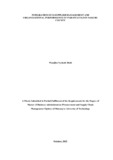| dc.description.abstract | This study sought to investigate the integration of e-supplier management and its influence on organizational performance. The study aimed to specifically; analyse e-information sharing and its influence on organizational performance, investigate e-tendering and its influence on organizational performance, assess e-payments influence on organizational performance and examine e-point of sale influence on organizational performance. Since suppliers are an important asset for organisational performance, it is imperative that they are well managed to establish mutual benefits. Therefore, the goal was to investigate whether parastatals had integrated e-supplier management in their already existing ICT capabilities to influence organizational performance. The study was anchored on two theories; the innovation diffusion theory to indicate the level of ICT integration and the Technology Acceptance Model (TAM), to show how compatibility and user belief are important for integration and performance. The study used null hypotheses to test the influence of each objective on organizational performance. The study adopted a descriptive research design. The study was undertaken in five (5) selected parastatals or state-owned organizations in Nakuru municipality with a total population of 236 employees in selected departments. By use of purposive sampling, a sample size of 91 respondents was used. The study used qualitative and quantitative research methods. The study applied closed and open-ended questionnaires with a five-point Likert scale, to collect data from the respondents. The data collected was coded using Statistical Package for Social Sciences (SPSS), analysed using descriptive and inferential statistics and presented using tables. The study also adopted multiple regression and ANOVA tests to test the influence, hypotheses and relationship between e-supplier management and organizational performance respectively. E-supplier management integration was moderate (M=3.42, SD=.97). The findings inferred that e-supplier management was statistically significant in predicting the performance of parastatals at p<.05 and that 21.9% of organizational performance was influenced by e-supplier management variables. It also showed that e-information sharing influences organizational performance at 9.4%, e-tendering at 3.3%, e-payments at 2.6% and epoint of sale at 22.1%. The study also showed e-information sharing, e-tendering, epayments and e-point of sale had a weak positive correlation with organizational performance at .325, .214, .197 and .481 respectively. The study recommends parastatals full integration of e-supplier management capabilities and to work with suppliers to allow accrual of benefits that will improve overall organizational performance. The study recommends further research be done on other components of e-supplier management such as eSRM, contracts management and e-supplier selection. | en_US |

